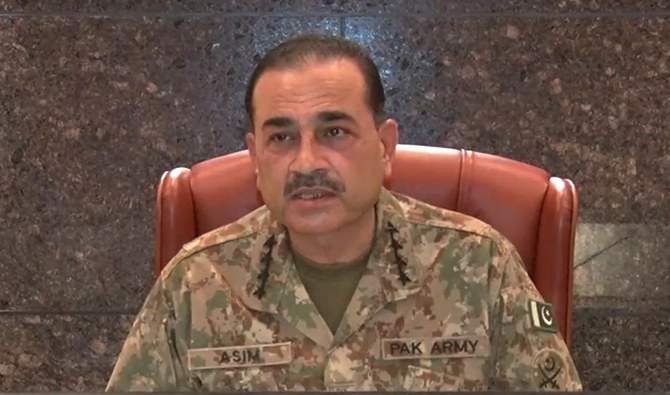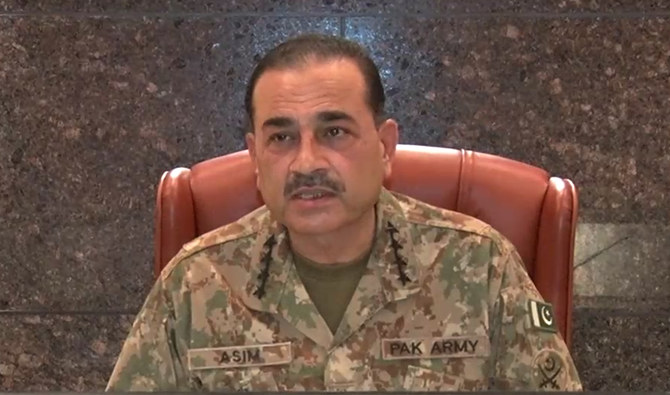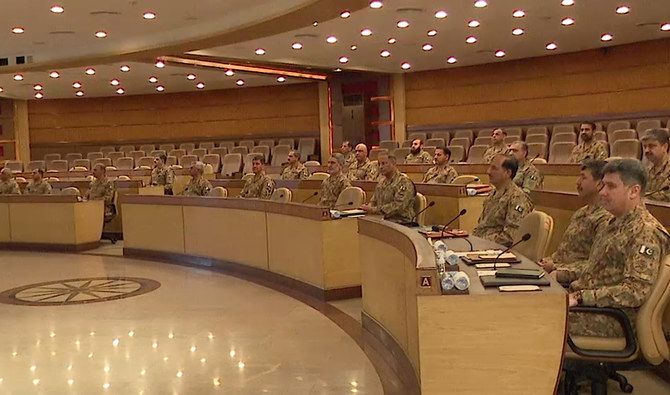ISLAMABAD: Pakistan’s army on Tuesday expressed dismay over “unsubstantiated allegations,” especially on social media, of interference in last month’s national election in the South Asian country, which was marred by a mobile service shutdown and prolonged delays in release of constituency results.
The development came a day after Shehbaz Sharif took oath as prime minister, following the Feb. 8 vote that presented no clear winner, but candidates backed by jailed former prime minister Imran Khan won more parliamentary seats than any other party.
Sharif’s Pakistan Muslim League-Nawaz (PML-N) party forged an alliance with ex-foreign minister Bilawal Bhutto-Zardari-led Pakistan Peoples Party (PPP) and other smaller groups to outnumber Khan-backed lawmakers in parliament for government formation.
Khan’s Pakistan Tehreek-e-Insaf (PTI) party, which was severely hamstrung ahead of the polls, with rallies banned, its party symbol taken away, and dozens of its candidates rejected from contesting polls, and few others have said the election was rigged to favor their rivals. Authorities have denied the allegation.
After a meeting of the army’s top commanders on Tuesday, the Inter-Services Public Relations (ISPR), the army’s media wing, said the armed forces of Pakistan, at a great peril to their primary responsibility, provided security for the conduct of polls as per the given mandate and had nothing to do with the electoral process.
“The forum expressed dismay that some vested small segments of polity and media especially social media have been maligning Armed Forces of Pakistan with unsubstantiated allegations of interference which is highly deplorable,” it said in a statement.
“It’s unfortunate that rather than focusing on real issues such as good governance, economic recovery, political stability and public well-being, entire focus of such vested elements is on creating political instability and uncertainty by attempting to scapegoat others for their own failings.”
Pakistan’s powerful army has ruled the nuclear-armed nation of more than 241 million people for over 30 years. Even when not in power, the army is considered by many to be the invisible guiding hand of politics with a key say in the country’s decisions relating to trade, economics, defense, foreign affairs, and national security.
At Tuesday’s meeting, the army’s corps commanders emphasized that due legal processes be followed with evidence and proof with regard to poll results, rather than resorting to “unconstitutional and uncalled for baseless political rhetoric and emotional outbursts,” according to the ISPR.
They noted with satisfaction the smooth democratic transition of power in the center and provinces, and hoped that the post-election environment would bring in “desired political and economic stability,” resulting into peace and prosperity for the people of Pakistan.
The army said it strongly believed that democratic consolidation was the way forward for the country.
“Forum affirmed that military leadership is cognizant of the full spectrum of the challenges and threats and it remains committed to shoulder its constitutionally mandated responsibilities with support of the resilient people of Pakistan,” the ISPR said.
“Forum reiterated to continue providing full support to the government in combating security threats and uplifting the socioeconomic growth in the country including wholehearted assistance in curbing all illegal activities including smuggling, hoarding, electricity theft, implementation of One Document Regime and respectable & safe repatriation of all illegal foreigners.”
In line with the resolve of the prime minister, the ISPR noted, the forum committed that planners, instigators, abettors, perpetrators and desecrators of martyrs’ monuments and attackers of military installations during May 9, 2023 violent protests would certainly be brought to justice.
The protests last year erupted over the brief arrest of ex-PM Khan, who was ousted in a parliamentary no-trust vote in April 2022, in a graft case. Several of his party’s members and supporters were subsequently rounded up and booked for violence, while some still remain behind bars.
Khan, who has been in jail himself since August last year on a slew of charges, maintains the generals orchestrated his ouster together with his rivals and the United States for pursuing an independent foreign policy for Pakistan. All three have denied the allegation.
The former premier maintains the cases against him are “politically motivated” and accused the army ahead of polls of trying to keep him from returning to power. The army denies interfering in politics.
“In this regard, malicious efforts to create distortions, confusion and disinformation are absolutely futile and only part of an organized campaign being launched for narrow political interests to blur the abhorrent activities that took place,” the ISPR said.
“The forum noted with concern organized misinformation and fake news being spread by certain nefarious elements to sow despondency and divisions within the society, and urged the proud people of Pakistan to remain positive and united and wholeheartedly participate in the progress and development of the country.”
Pakistan army says dismayed over ‘unsubstantiated allegations’ of interference in Feb. 8 elections
https://arab.news/bjmqe
Pakistan army says dismayed over ‘unsubstantiated allegations’ of interference in Feb. 8 elections

- Pakistan’s national election last month was marred by a mobile service shutdown, prolonged delays in release of results
- The indecisive election led to widespread allegations of result manipulation, mainly by jailed ex-premier Imran Khan’s party
Pakistan Deputy PM to attend SCO Foreign Ministers’ meeting in Kazakhstan tomorrow

- The SCO is a major trans-regional organization and its member states collectively represent nearly half of world population
- Deputy PM Ishaq Dar will also hold bilateral meetings with his counterparts on sidelines of the SCO Foreign Ministers’ meeting
ISLAMABAD: Ishaq Dar, Pakistan’s deputy prime minister and foreign minister, will attend a meeting of the Council of Foreign Ministers of the Shanghai Cooperation Organization (SCO) on Monday, Pakistani state media reported.
Founded in 2001, the SCO is a major trans-regional organization spanning South and Central Asia, with China, Russia, Pakistan, India, Uzbekistan, Tajikistan, Kyrgyzstan and Kazakhstan as its permanent members. The SCO member states collectively represent nearly half of the world’s population and a quarter of global economic output.
The organization’s agenda of promoting peace and stability, and seeking enhanced linkages in infrastructure, economic, trade and cultural spheres, is aligned with Pakistan’s own vision of enhancing economic connectivity as well as peace and stability in the region.
The two-day meeting of the SCO Council of Foreign Ministers will begin in Astana on Monday, according to the state-run Radio Pakistan broadcaster.
“Deputy Prime Minister and Foreign Minister Muhammad Ishaq Dar will represent Pakistan at two-day meeting of the Council of Foreign Ministers of Shanghai Cooperation Organization, beginning at Astana in Kazakhstan tomorrow,” the report read.
“The Foreign Minister will also hold bilateral meetings with his counterparts on the sidelines of the Council of Foreign Ministers meeting.”
Since becoming a full member of the SCO in 2017, Pakistan has been actively contributing toward advancing the organization’s core objectives through its participation in various SCO mechanisms.
During his visit to China this week, Dar also met SCO Secretary-General Ambassador Zhang Ming and reiterated Pakistan’s commitment to the organization’s charter and its ideals, the Pakistani foreign ministry said in a statement.
“He expressed Pakistan’s strong commitment to advancing SCO’s security and development cooperation agenda,” the statement said.
Pakistan’s Punjab warns of ‘intense’ heatwave in southern districts next week

- Authorities asked to set up heatwave counters in all hospitals, ensure supply of essential medicines
- Citizens are requested to take precautionary measures, avoid exertion and exercise in strong sunlight
ISLAMABAD: Authorities in Pakistan’s Punjab province have warned of an “intense” heat wave in southern districts of the province next week, urging people to take precautions and avoid going outdoors unnecessarily.
There is a severe risk of heatwave in Bahawalpur, Rahim Yar Khan, Dera Ghazi Khan and Multan districts from May 21 to May 27, according to the provincial disaster management authority (PDMA).
Authorities have been given instructions to set up heatwave counters in all hospitals and ensure the supply of all essential medicines.
“All departments can fight heat wave by working together and cooperating [with each other],” PDMA Director-General Irfan Ali Kathia said in a statement. “The next ten days are predicted to be engulfed by severe heat wave.”
Climate change-induced extreme heat impacts human health in multiple ways. Direct effects of exposure to extreme heat and heatwaves can include heat-related illnesses such as heat cramps, heat exhaustion, heatstroke, and hyperthermia. It can make certain chronic conditions worse, including cardiovascular, respiratory, and cerebrovascular disease and diabetes-related conditions, and can also result in acute incidents, such as hospitalizations due to strokes or renal disease.
Citizens are being informed about the dangers of heatwave through print, electronic and social media, according to the PDMA DG.
“The public is requested to take precautionary measures. Avoid exertion and exercise in strong sunlight,” he said. “Do not step out of the house unnecessarily. Wear light colored cotton clothes.”
People may dial the PDMA helpline 1129 or Rescue 1122 in case of an emergency situation, the official added.
Increased exposure to heat, and more heatwaves, have been identified as one of the key impacts of climate change in Pakistan, with people experiencing extreme heat and seeing some of the highest temperatures in the world in recent years. The South Asian country of more than 241 million, one of the ten most vulnerable nations to climate change impacts, has also recently witnessed untimely downpours, flash floods and droughts.
According to the Global Climate Risk Index, nearly 10,000 Pakistanis have died while the country has suffered economic losses worth $3.8 billion due to climate change impacts between 1999 and 2018. A deadly heatwave that hit Pakistan’s largest city of Karachi, the capital of Sindh, claimed 120 lives in 2015.
In 2022, torrential monsoon rains triggered the most devastating floods in Pakistan’s history, killing around 1,700 people and affecting over 33 million, a staggering number close to the population of Canada. Millions of homes, tens of thousands of schools and thousands of kilometers of roads and railways are yet to be rebuilt.
Helicopter carrying Iran’s president suffers a ‘hard landing,’ state TV says without further details
Helicopter carrying Iran’s president suffers a ‘hard landing,’ state TV says without further details

- Ebrahim Raisi was traveling in Iran’s East Azerbaijan province
- State TV described the area of the incident as being near Jolfa
DUBAI: A helicopter carrying Iranian President Ebrahim Raisi suffered a “hard landing” on Sunday, Iranian state television reported, without immediately elaborating.
Raisi was traveling in Iran’s East Azerbaijan province. State TV described the area of the incident happening as being near Jolfa, a city on the border with with the nation of Azerbaijan, some 600 kilometers (375 miles) northwest of the Iranian capital, Tehran.
Raisi had been in Azerbaijan early Sunday to inaugurate a dam with Azerbaijan’s President Ilham Aliyev. The dam is the third one that the two nations built on the Aras River.
Iran flies a variety of helicopters in the country, but international sanctions make it difficult to obtain parts for them. Its military air fleet also largely dates back to before the 1979 Islamic Revolution.
Raisi, 63, is a hard-liner who formerly led the country’s judiciary. He is viewed as a protégé of Iran’s Supreme Leader Ayatollah Ali Khamenei and some analysts have suggested he could replace the 85-year-old leader after his death or resignation from the role.
Around 540 Pakistani students to return from Bishkek today via commercial flights— deputy PM

- First batch of 130 Pakistani students from Bishkek arrived in Lahore on Saturday night
- Fifty students have also registered to return home via special air force flight, says deputy PM
ISLAMABAD: Deputy Prime Minister (DPM) Ishaq Dar announced the government has arranged three commercial flights to repatriate around 540 Pakistani students from Bishkek today, Sunday, following violent clashes in the city this week that led to the evacuations.
The development took place after frenzied mobs attacked foreign nationals in the Kyrgyz capital of Bishkek on Friday. The attacks began after videos of a brawl between Kyrgyz and Egyptian students went viral on social media, prompting furious mobs to target hostels of medical universities and private lodgings of international students, including Pakistanis, in the city.
The first batch of around 130 Pakistani students arrived in Lahore late Saturday night. According to official statistics, around 10,000 Pakistani students are enrolled in various educational institutions in Kyrgyzstan, with nearly 6,000 residing and studying in Bishkek.
“Three commercial special flights have been arranged for today (Sunday) on which 540 students will come back while 130 returned yesterday,” Dar told reporters during a media briefing in Lahore.
“A special flight of Pakistan Air Force will also bring around 130 students. So far, 50 students have registered themselves to come on this flight,” he added.
Dar said he spoke with the foreign minister of Kyrgyzstan today, Sunday, who assured him that the situation in the country was under control and that no new incidents had occurred since Friday afternoon.
“Kyrgyz foreign minister has confirmed that 16 foreign students including four to five Pakistanis got injured during this incident and are under treatment,” Dar said.
He added that Kyrgyzstan’s government has also assured that security at students’ hostels has been enhanced and that they were constantly monitoring the situation.
Earlier on Saturday evening, the PM’s Office said Prime Minister Shehbaz Sharif had directed Dar and another cabinet member, Amir Muqam, to travel to Bishkek on Sunday and address the situation there.
Dar said they were not traveling to the country at the Kyrgyzstan government’s request, adding that Pakistan has instead sent two officers from the foreign office to facilitate the country’s embassy.
“We were supposed to leave today for the Kyrgyz republic but their foreign minister requested [us] not to come because it would give the wrong impression about the incident and would provide fuel to the opposition,” Dar said.
He said Kyrgyzstan’s foreign minister has categorically denied any Pakistani students were killed in the clashes.
“Their (Kyrgyzstan) foreign minister also said they have arrested a few culprits and assured that no one involved will be spared,” the deputy prime minister said.
Dar said Pakistan’s foreign office had summoned the Kyrgyz Charge d’Affaires to the Ministry of Foreign Affairs on Saturday for a demarche over the current situation.
“It [violence] happened due to a clash between students and foreign students were targeted from Pakistan, India, Bangladesh and Arab countries,” he said.
Dar said Pakistan’s embassy had confirmed the situation is not tense anymore and that Pakistanis injured are being provided the best possible medical facilities.
Separately, in a telephone call with Pakistan’s Ambassador to Kyrgyzstan Hasan Ali Zaigham, PM Sharif instructed the embassy to make the necessary arrangements for the special plane to bring back Pakistani students.
The prime minister said injured Pakistani students should be brought back to Pakistan on a priority basis.
“The Prime Minister also instructed to ensure repatriation of family members residing in Kyrgyzstan with the Pakistani students,” PMO said.
Pakistan says will push for peace in Middle East if elected non-permanent UNSC member

- Elections for five of 10 non-permanent seats of UNSC for 2025-26 to take place on June 6
- Pakistan has been elected as non-permanent UNSC member seven times, most recently in 2013
ISLAMABAD: Pakistan will work for peace in the Middle East and Africa, and promote the right of self-determination of people living under foreign occupation if it gets elected as a non-permanent member of the Security Council, Pakistan’s ambassador to the UN said on Sunday.
Elections for five of the 10 non-permanent seats on the UN Security Council for 2025-26 are set to take place on June 6. Pakistan says its candidacy has the endorsement of the 55-member Asian Group.
The South Asian country has been elected to the Security Council seven times, most recently in 2013. Other times Pakistan got elected was in 1952-1953, 1968-1969, 1976-1977, 1983-1984, 1993-1994 and 2003-2004.
Speaking to members of the US-based Pakistan Students Association Coalition (PSA Coalition) via video link, Pakistan’s Ambassador to the UN Munir Akram said election to the Security Council would require Islamabad to play a leading role in addressing Kashmir, Afghanistan and counterterrorism issues.
“Pakistan will articulate developing countries’ aspirations, work for peace and in the Middle East and Africa as well as promote the right of self-determination for peoples under foreign occupation if elected as a non-permanent member of the UN Security Council,” Akram said, according to the state-run Associated Press of Pakistan (APP).
Akram spoke about the current state of the world. including key global challenges amid regional conflicts.
“He said that as the intense competition between major powers became a new reality of the world order, the world was undergoing a fast transition from its unipolar status to a bipolar plus order,” the APP said.
The Pakistani ambassador’s comments came as Israel continues its relentless military assault on Gaza. Israel’s attacks against Hamas have killed at least 35,386 people, mostly civilians, according to the Hamas-run Gaza health ministry.
The Jewish state’s siege has brought dire food shortages and the threat of famine to the densely populated territory.
Pakistan, which does not have diplomatic ties with Israel, has consistently called for an immediate ceasefire in the Middle East and urged world powers to work toward a two-state solution in the restive region, according to the aspirations of the people of Palestine.













